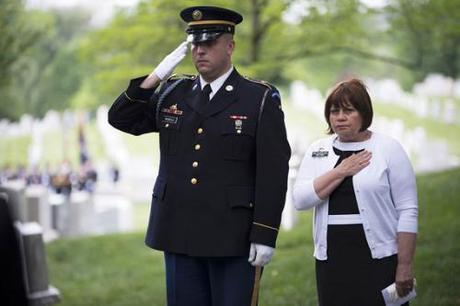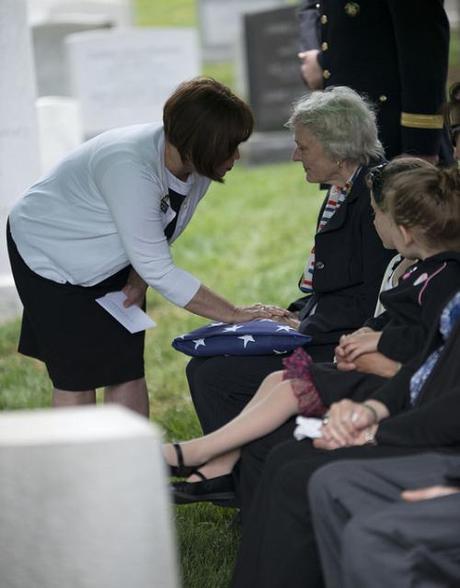
Soldiers: Every time a Soldier is either laid to rest or inurned at Arlington National Cemetery, an Army Arlington Lady is present to give solace. She hands two condolence cards to the bereaved, a formal one from the Army chief of staff and his wife, and a personal, handwritten one from the Army Arlington Lady herself.
The presence of an Arlington Lady at an Army funeral became a tradition 41 years ago, when Julia Abrams, wife of then Army Chief of Staff Gen. Creighton Abrams, followed in the steps of the Air Force Arlington Ladies. They had been created in 1948, when Air Force Chief of Staff Gen. Hoyt S. Vandenberg and his wife, Gladys, saw an Airman being buried with no one present other than a chaplain and honor guard. The couple thought that just wasn’t right.
The Army followed suit in 1973 and the Navy created its own group of Arlington Ladies in 1985 followed by the Coast Guard in 2006, but the Marine Corps has always sent a Marine representing the Commandant’s office.
“Our main purpose was to attend the funerals of Soldiers and veterans where no one was in attendance, but we actually attend all Army burials today,” said Margaret Mensch, chairwoman of the Army Ladies who’s been with the group since 1977. “We have an Arlington Lady coin and on the back in Latin it says, “No Soldier will ever be buried alone.”

Mensch says sometimes there simply are no relatives to attend the funeral service, other times families can’t come because they may live on the other side of the country, and travel expenses are simply too great.
Initially, the Army Ladies were part of Army Community Service so that meant we could incorporate enlisted men’s wives into the group with the officer’s wives, Mensch said, adding that the Army Ladies do have the wife of a retired sergeant major in their ranks.
“When we first started we worked out of the post chapel (on what was then Fort Myer) and we didn’t have military escorts … we’d either drive our own cars or ride with the chaplain, but we really needed to be recognized as part of the service,” Mensch says.
Showing up alone, their role at a funeral could be misconstrued, such as the widow who refused to leave her car because she thought the Arlington Lady was the “other” woman. Out of that arose their inclusion in the services.
Today, the four groups of Arlington Ladies are officially recognized as part of the service and work out of a joint office in the cemetery’s administration building.
The best thing to happen since they became “official” is that a member of the 3d U.S. Infantry Regiment (The Old Guard) escorts the Ladies to every Soldier’s funeral. “I do this for satisfaction; it’s a labor of love more than it is a job,” Mensch says. “We’re paying honor to a Soldier who served his country and whether family is there doesn’t matter, we will always be there – it just gives us a feeling that we’ve done something nice for a Soldier.”
In 2013, the Army Ladies said final goodbyes to more than 1,700 Soldiers. Like the sentinels at the Tomb of the Unknown Soldier who pace through any weather; funeral services also disregard weather conditions. Come sun, rain or snow, the Ladies will be there, not to mourn, but to say farewell.
Presently, the Army Arlington Ladies number 65 of which 50 are permanent and 15 are substitutes. Mensch makes the assignments every day after she receives a list of scheduled burials from the cemetery’s coordinators. There have been occasions where just one Lady attends as many as eight services in a day.
Joyce Johnson became an Arlington Lady in 2004, three years after her husband, Lt. Col. Dennis Johnson, was killed in the 9/11 attack on the Pentagon. “It was a way I felt I could honor my husband,” she explained. “I just wanted to help make someone else’s life better so I asked to join the Arlington Ladies … it’s really an honor to be able to do this.”
Rarely, if ever, do the Ladies know much about the Soldiers being buried which helps them maintain dry eyes, but the very first funeral Johnson ever attended as an Arlington Lady tested her emotionally. “I was right in the viewpoint of my husband’s grave and that was very hard, but it also gave me the courage to go through it. One of the funerals I did, there was only one person there and my heart ached for him because he was from a foreign country and only one of his parents was there,” she recalled.
“It’s important for someone to just be there to say, even though no other family is here, we care. We didn’t forget, your loved one was important, your loved one served our country.”
DCG

